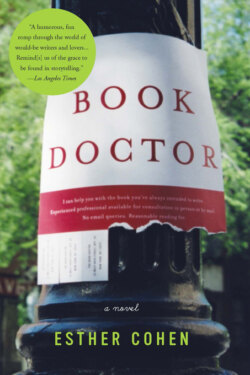Читать книгу Book Doctor - Esther Cohen - Страница 8
На сайте Литреса книга снята с продажи.
ОглавлениеWhat Harbinger Singh really wanted was a book. Sometimes, when he was being most honest, he would admit he didn’t care very much about the subject. He wanted a book he had written. He didn’t know why, and he didn’t much care. It could be about bluefish for all it really mattered. Some days though he was more high-minded. He wanted to write a book, or so he’d tell himself, about one critical dimension of life. Love, maybe, or racism, politics or war. On occasion, he imagined all of these unfolding into a great cosmological epic, a very long book, just enough to be considered weighty, with conscious, pyrotechnical prose, characters who talked and sweated elegantly, free spirits who constantly made love with one another inside old red wheel barrows and on moist, green banks of deep lagoons.
Singh himself was a lover of computers. But he made his living in law. Mostly tax law, though he wrote an occasional will. He didn’t mind taxes, and although he liked wills less, he didn’t dislike them either. He was a hard worker, and could sit in his office for hours on end, engaged in problems replete with cautious details. Taxes, he knew, were a universal problem. He felt that was as close as he could come, in his own way, to truth. As for wills, he told his clients that death told the truth and he was there to help this process along. He enjoyed meetings with clients, enjoyed the chance to ask them personal questions about their lives. And to turn their information into useful statistics.
He was not a handsome man, but he wasn’t unhandsome, either. His eyes were large and dark. He was often sparsely bearded, a half circle under his chin, a thin U.
His life was quiet. After a Scotch or two, he would describe it, if only to himself, as unworthy. He felt that destiny had not yet given him his due. His apartment was clean, with reasonable light. He earned sufficient money. He never ran out of toilet paper or soap, and always had enough bottled water. In the living room he’d placed a large rubber plant, green but not overly so, an ugly, quiet plant, never getting in his way. The plant did not make him feel guilty about water. He knew it would survive.
His divorce had not been hard. His wife, Carla, a lawyer like himself though she called herself attorney, had once specialized in pensions. She drifted away from Harbinger around the time he’d conceded his own unhappiness, three years before. Though he loved her still and he didn’t quite know why.
They had dinner the first Wednesday of every month, usually steak at a restaurant called Bill’s. Their conversations continued unchanged through the years: health benefits, welfare, diet, dogs, the Democratic Party. She often lectured him about public policy reform. In spite of this, he loved her. His wife was a high official, with offices in Albany and New York City. She was not particularly attractive. He liked looking at her, though, particularly her round bare shoulders, and her long, thin, intelligent hands. She’d liked sex well enough in the beginning so that Harbinger, at first anyway, felt reasonably satisfied. They’d drifted rather than broken. After a while, they’d each said they wanted more. He’d meant he wanted more of her. He never knew what she wanted, because she wouldn’t say.
He decided he would use his relationship with Carla as the basis for the novel he’d always intended to write. Her name was promising, more promising than her dullish demeanor, her thin brown hair, her elbows so sharp they could hurt, and her breasts that reminded him of two fried eggs without toast. In the novel though, Carla would be transformed into raven-haired Marla. She would be fiery, and consumed. And so too would Harbinger Singh. He decided to call it Hot and Dusty. He was the heat and she was the dust. Thinking about this cheered him.
